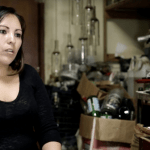Three Social Business Lessons from Detroit’s ‘Grassroots Entrepreneurs’
Resilient. Gritty. Proud. Such adjectives have been applied to Detroiters for a long time. Apt as these may be, they nevertheless recall the city’s well-known troubles – the global recession’s impact on the auto industry, the city’s bankruptcy and a long-running population decline – that combined to create a widespread image of urban decay. Detroit is struggling to regain its footing and become a prosperous and equitable city, and residents like Devita Davison are determined that hardship will not be the Motor City’s abiding story.

Devita Davison speaking at the University of Michigan.
Davison is the marketing and communications director of FoodLab Detroit, which supports and trains food entrepreneurs throughout the metro area.
We recently visited Davison and several other Detroit entrepreneurs. In our work at the William Davidson Institute’s Education Initiative (the William Davidson Institute is NextBillion’s parent organization), we try to learn the best ways to support entrepreneurs in emerging markets. So we, along with two of our business school professor colleagues from the Philippines, were especially interested in what Davison and others we met in Detroit would teach us. Here are some key learnings:
Identify community resources
In 2013, a group of women who loved to cook and share food sat around a table with an observation: There were plenty of cooks in Detroit who were operating informally for a little extra cash. Their biggest barrier to entering the formal economy, however, was production space – specifically, licensed commercial kitchens. They wondered how to provide these. Working with Jess Daniels and Davison, who would go on to co-found FoodLab Detroit, they hit on a ready source of kitchens: churches and community centers. Such kitchens were underutilized and could meet the state’s requirements with some minor upfitting.
With a small grant from United Way, Daniels and Davison set up a system to connect entrepreneurs with kitchens. Today, 235 Detroit-area food entrepreneurs – primarily low-income women – are members of FoodLab. They represent many stages of business growth, but the overarching objective is the same: Detroit residents employing Detroit residents.
With the auto industry unable to carry the economy as it once did, residents have turned to their skills and resourcefulness to generate income. This was itself a revelation for Dinah Pura T. Depositario, a business professor from the University of the Philippines: “I realized during the FoodLab visit that entrepreneurship in the U.S. can also be necessity-driven (as is the case with most Filipino entrepreneurs) and not as money-driven as I initially thought.”
FoodLab’s ethos closely follows the approach of asset-based community development, which creates opportunities based not on what a place is lacking, but on what is already there. This struck Rowena Gelvezon of the University of the Philippines as well: “Instead of focusing on what they do not have – (they) focused on what they have right there in Detroit.” Yes, FoodLab saw a source of kitchens – but even before this, it recognized the people who could grow if connected to spaces, training and, critically, one another.
Create networks
Connections are the entrepreneur’s lifeblood. Networking, then, is largely a continuation of the first point: Human beings are the greatest strength of any community. People generate ideas, swap experiences and provide one another access to market opportunities. Networking is a key to the entrepreneurship scene anywhere, but it is perhaps especially critical in a city – or market – getting back on its feet.
Often, networking comes directly out of FoodLab’s in-person training sessions, as we have found to often be true with traditional training programs. FoodLab’s private Facebook group is also known as a hive of information and introductions – from publicizing upcoming community events, to sharing best practices, to determining which area farmer has the right kind of potatoes for a certain soup. Monthly mixers allow members regular face time. According to Davison, this is integral to the organization’s end goal: a nurturing community, into which each person pays, to further a just and equitable food system.
As Depositario noted: “FoodLab is an excellent example of networks playing a more important role than funds in relation to entrepreneurial engagement. They did not have the money and production space but had an idea and had links with the groups which had well-equipped kitchens, and these paved the way.”
Gelvezon added: “In the Philippines, the common belief is that you need money to start a business. So if you do not have sufficient money – forget about putting up a venture. But from what I have learned from the FoodLab’s case is that money, while important, is not a primary consideration in starting a business. It starts with an idea, a vision. … My important takeaway from the FoodLabs case is, start a venture with a great idea and grow it through networks.”
As Gelvezon observes, networking is critical not only on the person-to-person level, but also the organizational level.
Another organization that leverages the power of networking is Detroit SOUP. Founded by Amy Kaherl and operating out of the Detroit incubator Ponyride, SOUP centers on networking. Each Detroit SOUP event features dinner and several four-minute presentations on projects that promote community-based development in Detroit. These presentations follow only two rules: 1) They must be Detroit-centered, so ideas stay concrete; and 2) They must be delivered with no technology, so people present their ideas as authentically as possible. At the end of the evening, attendees vote on the project to receive the evening’s proceeds. In a way, SOUP is a local, crowdfunding spin on a traditional business pitch competition.
SOUP’s unique model is not restricted to business ideas, and its projects often blur the lines of traditional sectors in pursuit of promoting “the redevelopment, reorganization, reimagining of our city.”
Like FoodLab, SOUP’s model begins with the assumption of Detroit’s plenty, rather than its scarcity. From this assumption, it brings people to the room to generate more together than each could on their own. Its highly replicable, localizable model has now taken off elsewhere, including in emerging markets like Nepal. Detroit SOUP even provides a free guide on its website – “Why and How to Soup” – to assist others in replicating its model.
Offer quality training and support services
One of the keys to FoodLab’s success has been its training and support model, by which people learn the business skills needed to parlay their cooking hobby into a profitable business. It has several mechanisms:
- Peer-to-peer learning events, in which food entrepreneurs share technical assistance on how to start a business, covering topics such as licensing and regulations, managing inventory, scaling and manufacturing, and marketing a food business.
- An internally-run institute, FoodLab Institute, which provides training and advising for more mature businesses.
- An affiliated incubator, Detroit Kitchen Connect, which provides shared workspace in an industrial kitchen at Detroit’s famous Eastern Market as well as in other commercial kitchens throughout Detroit. It also guides entrepreneurs as they form business plans, and learn their operational numbers and food unit costs. According to its director, Anika-Kafi Summers Grose, only around 5 percent of all food businesses are successful. Few have the support available at Detroit Kitchen Connect. Nevertheless, her point is that failure is a part of learning. FoodLab’s goal in creating Detroit Kitchen Connect is to help people learn, even if it means helping their idea fail in a relatively safe environment.
As these training and support services suggest, the resources within an ecosystem are especially critical to food entrepreneurship. Food entrepreneurs can only go so far in the informal economy, though many try.
These practices are working in Detroit. But they also show the potential of social entrepreneurship to contribute to a community’s economic uplift anywhere – when directed by and for its own residents, rather than external investors or consultants advocating a one-size-fits-all approach to development.
Davison shared the fond slogan of her grandfather: “Nothing about us without us is for us.” This insistence on self-determination characterizes many of the Detroit entrepreneurs we met. It is a powerful paradigm for emerging markets, which have often been on the receiving side of foreign aid or development schemes. But it is also a lesson for would-be providers of social entrepreneurship interventions: Make sure what you are offering is requested by the community, customized for the community and implemented with the community. Practiced in this way, social entrepreneurship can be truly community-based, and avoid the pitfalls of paternalism which plague other models of development. Detroit’s grassroots entrepreneurs prove it is possible.
- Categories
- Education, Social Enterprise




